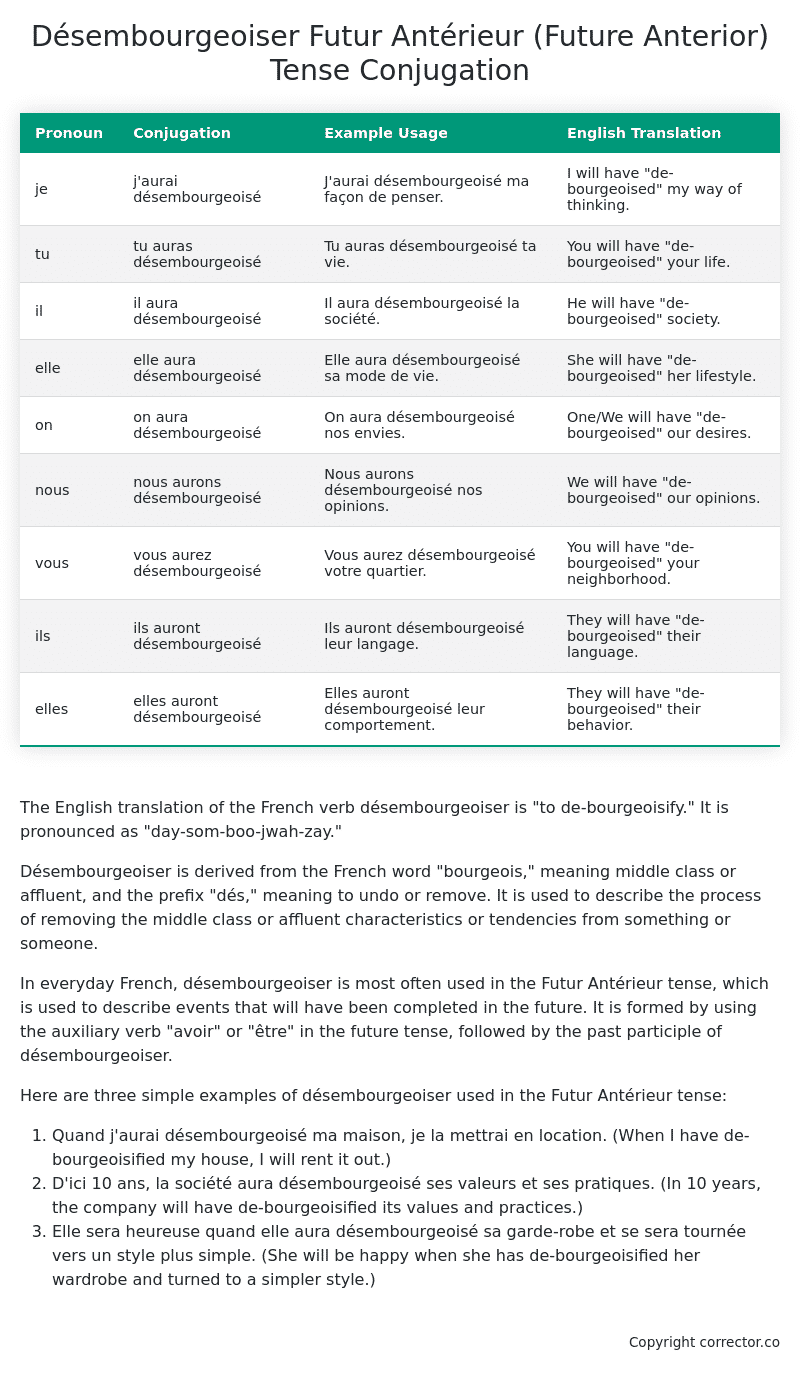Futur Antérieur (Future Anterior) Tense Conjugation of the French Verb désembourgeoiser
Introduction to the verb désembourgeoiser
The English translation of the French verb désembourgeoiser is “to de-bourgeoisify.” It is pronounced as “day-som-boo-jwah-zay.”
Désembourgeoiser is derived from the French word “bourgeois,” meaning middle class or affluent, and the prefix “dés,” meaning to undo or remove. It is used to describe the process of removing the middle class or affluent characteristics or tendencies from something or someone.
In everyday French, désembourgeoiser is most often used in the Futur Antérieur tense, which is used to describe events that will have been completed in the future. It is formed by using the auxiliary verb “avoir” or “être” in the future tense, followed by the past participle of désembourgeoiser.
Here are three simple examples of désembourgeoiser used in the Futur Antérieur tense:
- Quand j’aurai désembourgeoisé ma maison, je la mettrai en location. (When I have de-bourgeoisified my house, I will rent it out.)
- D’ici 10 ans, la société aura désembourgeoisé ses valeurs et ses pratiques. (In 10 years, the company will have de-bourgeoisified its values and practices.)
- Elle sera heureuse quand elle aura désembourgeoisé sa garde-robe et se sera tournée vers un style plus simple. (She will be happy when she has de-bourgeoisified her wardrobe and turned to a simpler style.)
Table of the Futur Antérieur (Future Anterior) Tense Conjugation of désembourgeoiser
| Pronoun | Conjugation | Example Usage | English Translation |
|---|---|---|---|
| je | j’aurai désembourgeoisé | J’aurai désembourgeoisé ma façon de penser. | I will have “de-bourgeoised” my way of thinking. |
| tu | tu auras désembourgeoisé | Tu auras désembourgeoisé ta vie. | You will have “de-bourgeoised” your life. |
| il | il aura désembourgeoisé | Il aura désembourgeoisé la société. | He will have “de-bourgeoised” society. |
| elle | elle aura désembourgeoisé | Elle aura désembourgeoisé sa mode de vie. | She will have “de-bourgeoised” her lifestyle. |
| on | on aura désembourgeoisé | On aura désembourgeoisé nos envies. | One/We will have “de-bourgeoised” our desires. |
| nous | nous aurons désembourgeoisé | Nous aurons désembourgeoisé nos opinions. | We will have “de-bourgeoised” our opinions. |
| vous | vous aurez désembourgeoisé | Vous aurez désembourgeoisé votre quartier. | You will have “de-bourgeoised” your neighborhood. |
| ils | ils auront désembourgeoisé | Ils auront désembourgeoisé leur langage. | They will have “de-bourgeoised” their language. |
| elles | elles auront désembourgeoisé | Elles auront désembourgeoisé leur comportement. | They will have “de-bourgeoised” their behavior. |
Other Conjugations for Désembourgeoiser.
Le Present (Present Tense) Conjugation of the French Verb désembourgeoiser
Imparfait (Imperfect) Tense Conjugation of the French Verb désembourgeoiser
Passé Simple (Simple Past) Tense Conjugation of the French Verb désembourgeoiser
Passé Composé (Present Perfect) Tense Conjugation of the French Verb désembourgeoiser
Futur Simple (Simple Future) Tense Conjugation of the French Verb désembourgeoiser
Futur Proche (Near Future) Tense Conjugation of the French Verb désembourgeoiser
Plus-que-parfait (Pluperfect) Tense Conjugation of the French Verb désembourgeoiser
Passé Antérieur (Past Anterior) Tense Conjugation of the French Verb désembourgeoiser
Futur Antérieur (Future Anterior) Tense Conjugation of the French Verb désembourgeoiser (this article)
Subjonctif Présent (Subjunctive Present) Tense Conjugation of the French Verb désembourgeoiser
Subjonctif Passé (Subjunctive Past) Tense Conjugation of the French Verb désembourgeoiser
Subjonctif Imparfait (Subjunctive Imperfect) Tense Conjugation of the French Verb désembourgeoiser
Conditionnel Présent (Conditional Present) Tense Conjugation of the French Verb désembourgeoiser
Conditionnel Passé (Conditional Past) Tense Conjugation of the French Verb désembourgeoiser
L’impératif Présent (Imperative Present) Tense Conjugation of the French Verb désembourgeoiser
L’infinitif Présent (Infinitive Present) Tense Conjugation of the French Verb désembourgeoiser
Struggling with French verbs or the language in general? Why not use our free French Grammar Checker – no registration required!
Get a FREE Download Study Sheet of this Conjugation 🔥
Simply right click the image below, click “save image” and get your free reference for the désembourgeoiser Futur Antérieur tense conjugation!

Désembourgeoiser – About the French Futur Antérieur (Future Anterior) Tense
Construction
Common Everyday Usage Patterns
Interactions with Other Tenses
For example
Summary
I hope you enjoyed this article on the verb désembourgeoiser. Still in a learning mood? Check out another TOTALLY random French verb conjugation!


